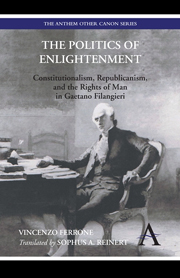 The Politics of Enlightenment
The Politics of Enlightenment Book contents
- Frontmatter
- Contents
- Foreword
- Preface
- Part One The New Politics ‘Ex Parte Civium’
- Chapter One The Enlightenment and the Political Critique of the Scientia Juris
- Chapter Two The Critique of the British Constitutional Model and the Political Laboratory of the American Revolution
- Chapter Three Against Montesquieu and Class Constitutionalism: The Denunciations of the ‘Feudal Monster’ and the ‘Tempered Monarchy’
- Chapter Four Constructing a New Constitutionalism: Masonic Sociability and Equality
- Chapter Five The Neapolitan School of Natural Law and the Historical Origins of the Rights of Man
- Chapter Six Beyond ‘Reason of State’: The Moral and Religious Foundations of the New Politics Ex Parte Civium
- Chapter Seven Nation or Fatherland? The Republican and Constitutional Patriotism of italian Enlightenment Thinkers
- Part Two A Difficult Legacy
- Notes
- Index
Chapter Three - Against Montesquieu and Class Constitutionalism: The Denunciations of the ‘Feudal Monster’ and the ‘Tempered Monarchy’
from Part One - The New Politics ‘Ex Parte Civium’
Published online by Cambridge University Press: 05 February 2013
- Frontmatter
- Contents
- Foreword
- Preface
- Part One The New Politics ‘Ex Parte Civium’
- Chapter One The Enlightenment and the Political Critique of the Scientia Juris
- Chapter Two The Critique of the British Constitutional Model and the Political Laboratory of the American Revolution
- Chapter Three Against Montesquieu and Class Constitutionalism: The Denunciations of the ‘Feudal Monster’ and the ‘Tempered Monarchy’
- Chapter Four Constructing a New Constitutionalism: Masonic Sociability and Equality
- Chapter Five The Neapolitan School of Natural Law and the Historical Origins of the Rights of Man
- Chapter Six Beyond ‘Reason of State’: The Moral and Religious Foundations of the New Politics Ex Parte Civium
- Chapter Seven Nation or Fatherland? The Republican and Constitutional Patriotism of italian Enlightenment Thinkers
- Part Two A Difficult Legacy
- Notes
- Index
Summary
As one of the most suggestive and important elements in the construction of a new enlightened constitutionalism, the polemic against British legal, political, and institutional thought inspired by the lessons of the American Revolution was certainly no isolated current in the rhetorical structure of the Scienza della legislazione. The work was in fact consciously constructed though a scheme that, on the one hand, planned a punctilious and caustic critique of Old Regime Europe, of its unfair social and political order, and of its traditional corporative constitutionalism. On the other, it formulated precise proposals for constructing a new society on the basis of legislation re-founded on the values and principles of the fin-de-siècle Enlightenment. In this sense, Montesquieu, always careful to reason ‘rather about what has been done than about what should be done’ [I, 41], remained a central interlocutor. Similarly, a confrontation with the Esprit des lois was inevitable in terms of the historical function of liberty and the guarantee offered by so-called intermediary powers against the despotic temptations of monarchies after Louis XIV, a fundamental issue for the juridical and political debates of eighteenth-century Europe. It represents the veritable keystone of that which recent literature has defined ‘Old Regime constitutionalism.’ Especially in Naples, where sensibilities to the legal and institutional dimensions of politics were strong, one of the highest magistrates of the kingdom, the Delegato della Real Giurisdizione Niccolò Fraggianni, developed an effective constitutional ideology for the ministero togato, the ministry of the robe, capable of defending magistrate class interests against the crown's project of constructing a great national monarchy.
- Type
- Chapter
- Information
- The Politics of EnlightenmentConstitutionalism, Republicanism, and the Rights of Man in Gaetano Filangieri, pp. 28 - 45Publisher: Anthem PressPrint publication year: 2012


